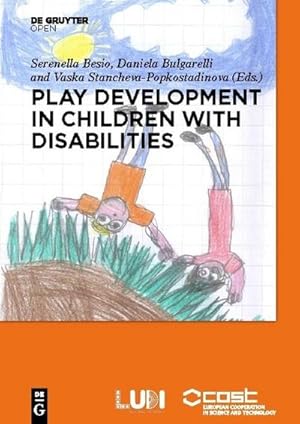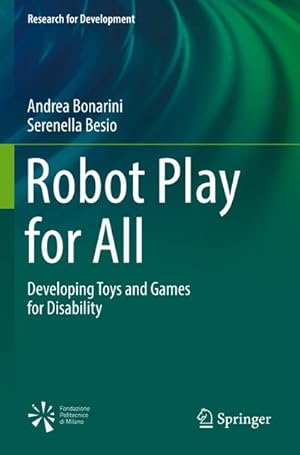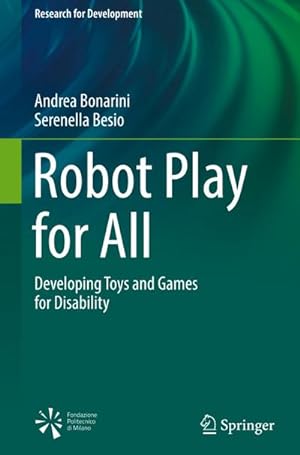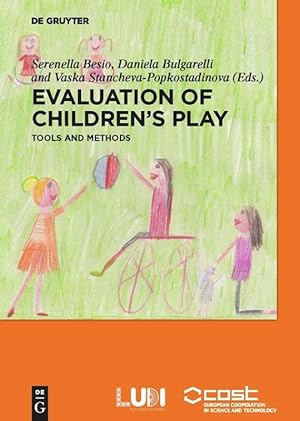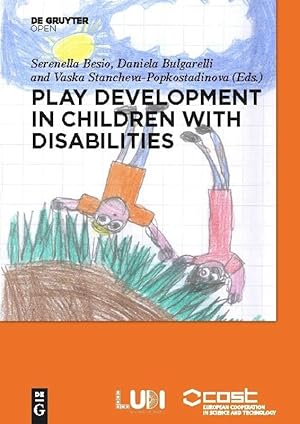BESIO SERENELLA (5 Ergebnisse)
Produktart
- Alle Produktarten
- Bücher (5)
- Magazine & Zeitschriften
- Comics
- Noten
- Kunst, Grafik & Poster
- Fotografien
- Karten
-
Manuskripte &
Papierantiquitäten
Zustand
- Alle
- Neu
- Antiquarisch/Gebraucht
Einband
Weitere Eigenschaften
- Erstausgabe
- Signiert
- Schutzumschlag
- Angebotsfoto
Land des Verkäufers
Verkäuferbewertung
-
Play development in children with disabilties
Verlag: De Gruyter Open Poland, 2017
ISBN 10: 311052211XISBN 13: 9783110522112
Anbieter: AHA-BUCH GmbH, Einbeck, Deutschland
Buch
Buch. Zustand: Neu. Druck auf Anfrage Neuware - Printed after ordering - This book is the result of the first two-year work of Working Group 1 of the network 'LUDI - Play for children with disabilities'. LUDI is an Action (2014-2018) financed by COST; it is a multidisciplinary network of more than 30 countries and almost 100 researchers and practitioners belonging to the humanistic and technological fields to study the topic of play for children with disabilities within the framework of the International Classification of Functioning Disability and Health (WHO, 2001).The principal objective of this book is to bring the LUDI contribution to the important topic of play in children with disabilities, because today an international consensus on the definition of play and disabilities is still lacking. The process of ensuring equity in the exercise of the right to play for children with disabilites requests three actions: to approach this topic through a 'common language', at least all over Europe; to put play at the centre of the multidisciplinary research and intervention regarding the children with disabilities; to grant this topic the status of a scientific and social theme of full visibility and recognized authority. Children with disabilities face several limitations in play, due to several reasons: impairments; playgrounds, toys and other play tools that are not accessible and usable; environments and contexts that are not accessible nor inclusive; lack of educational awareness and intentionality; lack of specific psycho-pedagogical and rehabilitative competence; lack of effective intervention methodologies. Moreover, disabled children's lives are dominated by medical and rehabilitative practices in which play is always an activity aiming to reach an objective or to provoke an improvement; play for the sake of play is considered a waste of time. The concept of play for the sake of play strongly refers to the distinction between play activities and play-like activities. Play activities are initiated and carried out by the player (alone, with peers, with adults, etc.) for the only purpose of play itself (fun and joy, interest and challenge, love of race and competition, ilinx and dizziness, etc.). They have of course consequences on growth and development, but these consequences are not intentionally pursued. Play-like activities are initiated and conducted by an adult (with one or more children), in educational, clinical, social contexts; they are playful and pleasant, but their main objective is other than play: e.g., cognitive learning, social learning, functional rehabilitation, child's observation and assessment, psychological support, psychotherapy, etc. This book, then, contributes to a clear distinction between play and play-like activities that, hopefully, will bring to new developments in play studies. ABSTRACTING & INDEXING Play development in children with disabilties is covered by the following services: Baidu ScholarBayerische StaatsbibliothekBDSBoDBowker Book DataCNKI Scholar (China National Knowledge Infrastructure)DimensionsDOAB (Directory of Open Access Books)EBSCOElsevier - Scopus BooksExLibrisGoogle BooksGoogle ScholarNavigaReadCubeSemantic ScholarTDOne (TDNet)WorldCat (OCLC)X-MOLAdditionally, the proceedings volume is registered and indexed in the Crossref database and accessible on Amazon.
-
Robot Play for All : Developing Toys and Games for Disability
Verlag: Springer International Publishing, 2023
ISBN 10: 3031050444ISBN 13: 9783031050442
Anbieter: AHA-BUCH GmbH, Einbeck, Deutschland
Buch
Taschenbuch. Zustand: Neu. Druck auf Anfrage Neuware - Printed after ordering - This book presents a comprehensive guide to the design of playing robots and the related play experiences. Play is a natural activity for building and improving abilities, and it reveals important particularly for persons with disabilities. Many social, physical and cultural factors may hinder children with disabilities from fully enjoying play as their peers. Autonomous robots with specific characteristics can enhance the ludic experience, having implications for the character of the play and presenting opportunities related to autonomy and physical movement, the very nature of robots. Their introduction into play thus provides everybody, and in particular persons with disabilities, new possibilities for developing abilities, improving general status, participating in social contexts, as well as supporting professionals in monitoring progress.This book presents a framework for the design of playful activities with robots, developed over 20 years' experience at AIRLab - POLIMI. Part 1 introduces the play concepts and characteristics, and research results about play of children with different kinds of impairments. Part 2 focuses on implementing robots able to play. The design of playful activities is discussed, as well as the necessary characteristics for them to be useful in both general play and activities involving disability-related limitations. In Part 3, the defined framework is used to analyze possibilities involving robots available on the toy market, robots developed at research labs, and robots to be developed in the next future. The aim of the book is to give developers, caregivers, and users a set of methodological tools for selecting, exploring, and designing inclusive play activities where robots play a central role.
-
Robot Play for All : Developing Toys and Games for Disability
Verlag: Springer International Publishing, 2022
ISBN 10: 303105041XISBN 13: 9783031050411
Anbieter: AHA-BUCH GmbH, Einbeck, Deutschland
Buch
Buch. Zustand: Neu. Druck auf Anfrage Neuware - Printed after ordering - This book presents a comprehensive guide to the design of playing robots and the related play experiences. Play is a natural activity for building and improving abilities, and it reveals important particularly for persons with disabilities. Many social, physical and cultural factors may hinder children with disabilities from fully enjoying play as their peers. Autonomous robots with specific characteristics can enhance the ludic experience, having implications for the character of the play and presenting opportunities related to autonomy and physical movement, the very nature of robots. Their introduction into play thus provides everybody, and in particular persons with disabilities, new possibilities for developing abilities, improving general status, participating in social contexts, as well as supporting professionals in monitoring progress.This book presents a framework for the design of playful activities with robots, developed over 20 years' experience at AIRLab - POLIMI. Part 1 introduces the play concepts and characteristics, and research results about play of children with different kinds of impairments. Part 2 focuses on implementing robots able to play. The design of playful activities is discussed, as well as the necessary characteristics for them to be useful in both general play and activities involving disability-related limitations. In Part 3, the defined framework is used to analyze possibilities involving robots available on the toy market, robots developed at research labs, and robots to be developed in the next future. The aim of the book is to give developers, caregivers, and users a set of methodological tools for selecting, exploring, and designing inclusive play activities where robots play a central role.
-
Evaluation of childrens\ play
Verlag: De Gruyter Poland, 2018
ISBN 10: 3110610574ISBN 13: 9783110610574
Anbieter: moluna, Greven, Deutschland
Buch
Gebunden. Zustand: New.
-
Play development in children with disabilties
Verlag: De Gruyter Poland, 2017
ISBN 10: 311052211XISBN 13: 9783110522112
Anbieter: moluna, Greven, Deutschland
Buch
Gebunden. Zustand: New.


